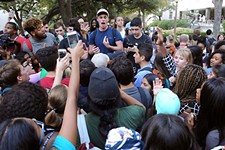And Then There Were Two
UT takes "third party" option off table for Cactus Cafe
By Richard Whittaker, 10:00AM, Thu. Apr. 22, 2010
"The Cactus Cafe lives on," UT's Vice President for Student Affairs Juan Gonzalez told the crowd at Tuesday's public forum on the future of the venue in the Texas Union.
"What does that mean?" replied a member of that crowd.
With Gonzalez and Texas Union Executive Andy Smith scheduled to make a presentation to the Union Board on April 30, the clock is ticking on possible futures for the venue. What Gonzalez is looking for now is "a business model that makes sense."
UT outlined three possible plans in early April. So what is still up for discussion and, as of Tuesday what, has changed?
First up, option one, "by which the university enters into a contract with an external third party to manage the Cactus Cafe," is dead. Gonzalez called it "no longer viable." Now that's not a surprise, because the Union is restricted by a federal funding-related limit allowing a maximum of 10% of its floorspace to be run by private entities. It's already at that cap, so unless it closed one franchise there was no way to go down that path anyway.
So that leaves option two ("A self-operating model by which a university office oversees the Cactus Cafe program, as it is currently managed") or option three ("A partnership with KUT Radio in which KUT will share Cactus Cafe programming responsibilities with student organizations.")
However, there have been some evolutions in both plans since their initial presentation in early April. Option two, Gonzalez said, "was to have the Texas Union management run the operation, also known as self-operation." That's a slight change, as previously the "university office" to run the room was unnamed. Since the cafe is already technically under the union management, that seems to be business as usual. However, the Texas Union management could make major changes, including laying off all the staff and turning the venue into a juggling school: As long as it hit Gonzalez' idea of a viable business model.
Option three is now "partnering with an internal University of Texas entity, the KUT radio station," Gonzalez said. "KUT made a expression of, can we be of service?" he added, but there's a big difference between being of service and taking over a half million dollar a year business with a liquor license. So this still requires more examination.
Looking at the April 8 "vision draft", KUT was to "manage the cactus venue on specified dates." Its very specifically defined role was to "produce and promote performances […] during an annual set of dates outside the main academic calendar (approximately 150 nights) [and] additional dates if available and practical to do so."
What Gonzalez presented seems to hand the venue over to KUT with provisos for student involvement and booking. His model, he said, "is for twelve months out of the year, a continuous full operation." This would mean a full-time manager employed through KUT (be interesting where they can get the money from before the next financial year kicks in, especially since they need to find $5.5 million for their new home in the Belo Center for New Media.)
The argument was made that KUT has experience with live music: In 2009, Texas Performing Arts assistant director Cameron Smith said, "KUT presented close to 300 live performances. That's more than double what the Cactus did." Of course, Smith overlooked the fact that the venue is also a working bar that is open six days of the week, serving the campus population whether there's a band there or not. In fact, it's the only accessible bar on campus for the 39% of students who are of drinking age.
What's worrying is that there was a subtext of some comments that an old guard, based off-campus, was trying to keep the cafe in amber and exclude students from their own venue. "We've looked at student involvement, student participation, student access. The students want in," Gonzalez said, thus seemingly ignoring the fact that, as one of the ultimate powers in the union, he's been the running the place. As we've said before, if student exclusion and a budget deficit were such a big issue, where were Gonzalez and his helpful reforms before he tried to close the place?
There were also a number of students complaining that the venue skewed too old and that they didn't want to subsidize something they don't use. That argument makes complete sense, right up to the point that one remembers that the majority of student union events are subsidized by student fees, and only a minority of students go to any one event. For example, student government has rightfully been proud of the 15,000 people it attracted by booking Girl Talk for the recent 40 Acres Fest: Do the other 35,000 students get a refund, since they weren't there? Of course not. That's how unions work.
That discussion, with its underlying presumption of who are real students and how Gonzalez is the cafe's defender, raised some eyebrows amongst members of Student Friends of the Cactus Cafe. They're the ones who, if anyone needs reminding, were calling for the cafe to stay open while Gonzalez wanted to shut it. It was seemingly with no irony at all that he claimed that his vision for ten years from now is for the Cactus Cafe to be "one of the hottest, most sought after tickets in town."
Where the questioning got really sticky was the question of who will run the bar. In the April 8 vision plan, the proposal was that "KUT will operate, via a university approved vendor, a Cactus bar with food and beverage sales in conjunction with performances." The broad suspicion has been that this meant yet another contract for catering mega-corp Aramark (which, oddly considering the location, has a long history of union-busting.) When asked about that, Gonzalez went back to his opening mantra: That option one is off the table, and there will be "no Aramark Cactus Cafe."
But the leeway within that phrase "a business model that makes sense" does nothing to clarify the issue of whether they would be part of the mix as a sub-contractor. All Gonzalez said when pressed on this issue was that any management plan "will have to step up to the plate and say, this is how we intend to run it in a smart, if that's how we decide to go, in a smart, self-sustained modality."
Like the audience member said, "What does that mean?"
A note to readers: Bold and uncensored, The Austin Chronicle has been Austin’s independent news source for over 40 years, expressing the community’s political and environmental concerns and supporting its active cultural scene. Now more than ever, we need your support to continue supplying Austin with independent, free press. If real news is important to you, please consider making a donation of $5, $10 or whatever you can afford, to help keep our journalism on stands.
Richard Whittaker, Oct. 27, 2016
Richard Whittaker, July 7, 2016
Dina Barrish, April 17, 2024
Rachel Rascoe, May 21, 2021
June 5, 2025
June 6, 2025
UT, Cactus Cafe, Friends of the Cactus Cafe, Aramark, Juan Gonzalez, Andy Smith












